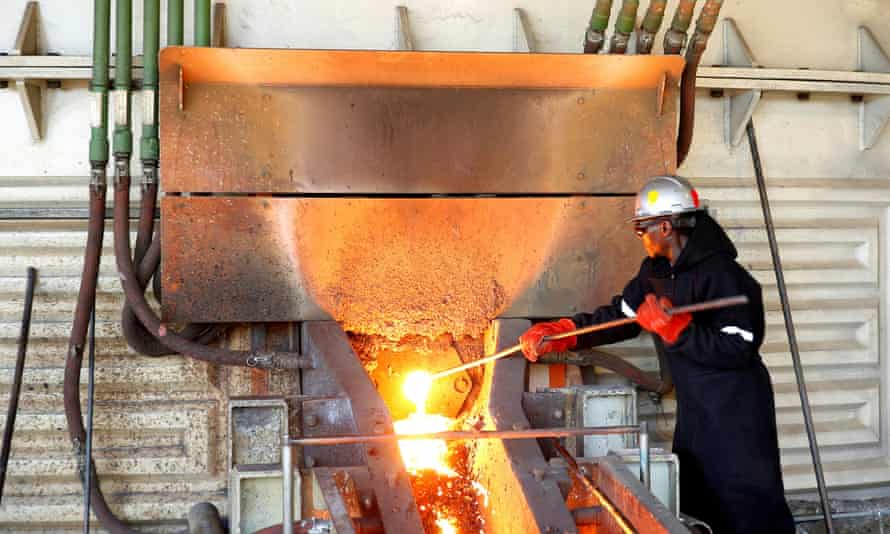A third of top UK firms' CO2 emissions not in line with global climate goals
Analysis shows emissions from 31 FTSE 100 companies are well above what’s needed to hit Paris targets
 |
Jasper Jolly @jjpjolly-Mon 1 Mar 2021
Three out of 10 of the UK’s biggest public companies emit carbon dioxide at a rate that would contribute significantly to the climate crisis, according to analysis that shows the scale of the challenge for corporate Britain to cut emissions to zero.
Thirty-one members of the FTSE 100, the index of Britain’s largest listed companies, are emitting carbon dioxide at a rate consistent with global temperature increases of 2.7C or more by 2050, according to analysis by Arabesque, a company that provides climate data to investors.
Highlighting the mounting risks to the planet, the rise would be above the target set under the 2015 Paris climate accords to limit global heating to below 2C and pursue efforts to limit it to 1.5C. A temperature rise of 2.7C is thought to be likely to lead to severe damage to the environment and to human life.
Oil companies including BP and Royal Dutch Shell are among those that produce carbon dioxide emissions consistent with temperature rises of more than 2.7C, even without taking into account the emissions related to the fossil fuels they dig up and sell, known as scope 3 emissions.
The mining sector also performed poorly, with Anglo American, Antofagasta, BHP, Evraz, Fresnillo and Polymetal all among the companies scored at above 2.7C.
Georg Kell, Arabesque’s chair, said he believed the momentum has turned decisively in favour of decarbonisation in recent years, although investors were only starting to consider climate risks as financial risks. However, he added that there were still issues with companies’ disclosures of their emissions.
“Too many companies are playing the benchmarks to look good,” Kell said. “Our current system does not adequately price the good and the bad. Our old systems still do valuations based on past experiences.”
Kell, who previously founded the United Nations Global Compact, a voluntary pact between business leaders hoping to cut emissions, said he hoped that the UN’s Cop26 climate meeting, to be hosted by the UK this year, could prove to be as important a landmark moment as the Paris agreement in the push for decarbonisation.
Goals for the summit, a key event for the UK government, might include forcing laggards to catch up or even moving towards a regime of enforcement of enforcement of decarbonisation targets, as well as opening the way to further collaboration efforts.
“I’m very optimistic now because we have an historical alignment – the politics is aligned,” he said.
The push to green the UK economy has gained momentum as well. Many of the companies at the 2.7C or higher level on current emissions have recently committed to setting science-based targets, which are based on United Nations benchmarks and are viewed by environmentalists as the gold standard of audited plans to cut emissions.
They included packaging company Smurfit Kappa, property company British Land and water companies Severn Trent and United Utilities. Decarbonisation technology does not yet exist at scale for airlines, but International Airlines Group, the owner of British Airways, has committed to setting a science-based target once parameters for airlines are agreed, which is likely to be this year. Building materials company CRH disputed Arabesque’s findings, saying it has a science-based target at a 2C scenario that has been independently verified to be aligned with the Paris climate goals.
Arabesque assigned scores to most of the FTSE 100 by calculating their greenhouse gas emissions per dollar of revenue, a measure based on the latest disclosed emissions that allows comparisons between companies of different sizes. The scores only took account of scope 1 and 2 emissions, which are those directly under the companies’ operational control or resulting from their use of electricity, steam and energy.
Some large polluters on the FTSE 100, including Anglo American, BP, Evraz and Glencore, have said they will cut emissions to net zero before 2050, but have given little detail on how they will achieve this.
Some 27 of the 83 companies analysed have already reduced their emissions intensity at a rate that is compatible with keeping temperature increases to 2C or lower.
Arabesque’s analysis does not cover the entire FTSE 100 as data from some companies is not up to date. Those companies not included are mainly services companies, which tend to have smaller direct carbon emissions, although some of those companies including banks have been criticised for funding other polluting companies.
Companies consistent with 2.7C heating or more: Admiral Group (insurance), Anglo American (mining), Antofagasta (mining), Ashtead (equipment rental), Associated British Foods (food and retail), BHP (mining), BP (oil), Bunzl (packaging), DS Smith (packaging), Evraz (mining), Ferguson (heating products), Fresnillo (mining), Glencore (mining), Intertek (product testing), Morrisons (supermarket), National Grid (electricity), Next (retail), Pennon Group (water), Polymetal (mining), Rentokil Initial (pest control and cleaning), Rio Tinto (mining), Royal Dutch Shell (oil), Smith & Nephew (medical equipment), and Whitbread (hospitality)
Companies at 2.7C, but committed to science-based targets: British Land (property), CRH (building materials), Croda (chemicals), International Airlines Group (airline), Smurfit Kappa (packaging), Severn Trent (water), and United Utilities (water)
All of the companies that responded to requests for comment said they were working to cut their carbon emissions by 2050.


No comments:
Post a Comment
Note: only a member of this blog may post a comment.